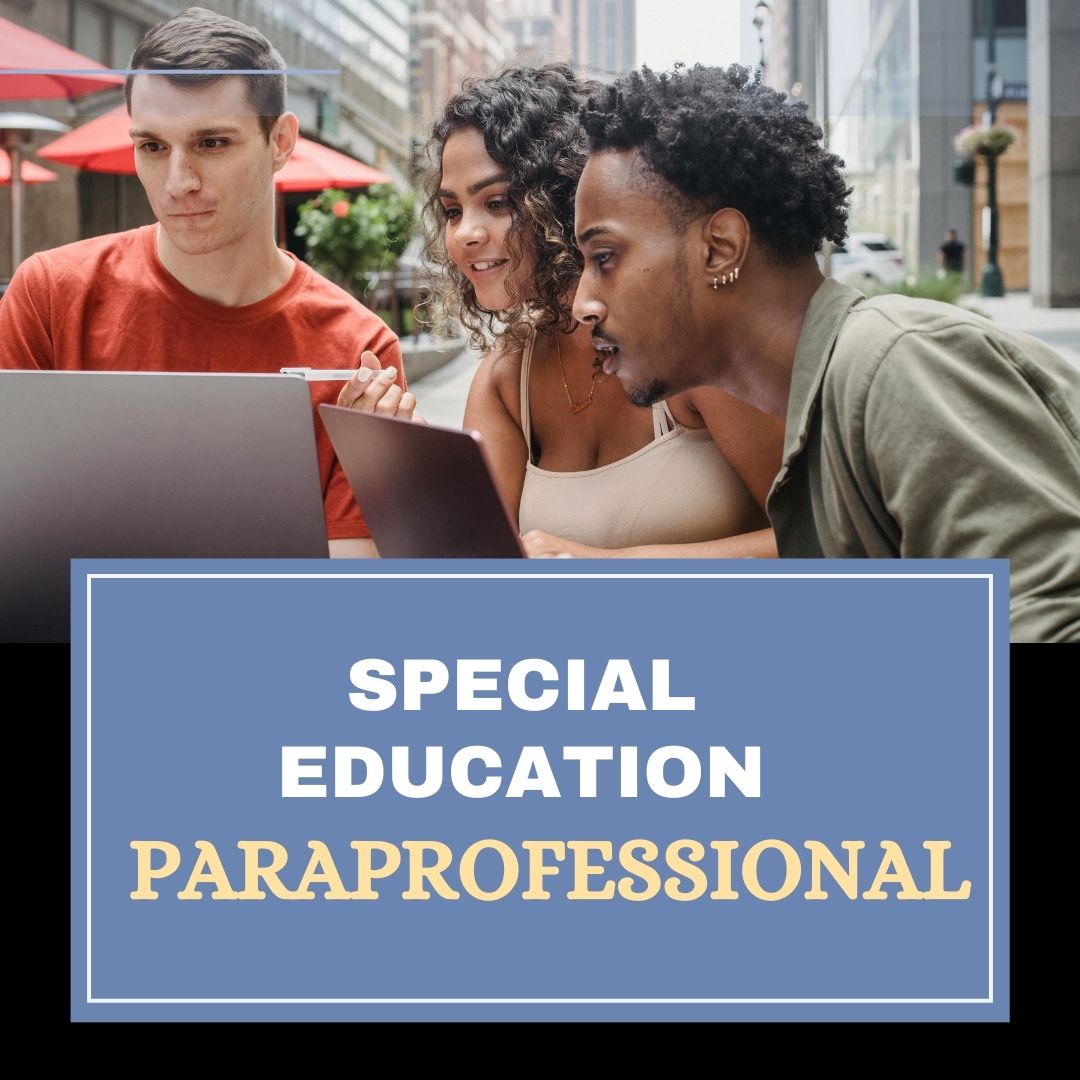Special Education Paraprofessional in Classrooms
A Special Education Paraprofessional assists students with disabilities, facilitating personalized learning and support. They work closely with teachers to implement educational plans and accommodate individual needs.
Special Education Paraprofessionals play a crucial role in the academic and social development of students who require special education services. Through one-on-one instruction, adapting materials, and monitoring progress, these paraprofessionals ensure that each student has access to an inclusive, supportive learning environment.
Their work often extends beyond academic support, encompassing life skills coaching and aiding students with physical and communicative needs. The goal is to empower students, fostering independence and helping them overcome educational barriers. Their presence in the classroom provides essential support, often bridging gaps between students’ diverse needs and the standard curriculum.

The Vital Role Of Paraprofessionals
Paraprofessionals, often the unsung heroes of special education, carry a torch of hope for many students. With heart and dedication, they enrich the educational landscape. They provide tailored support, which is essential for student success.
Supporting Diverse Learners
Every child learns differently. Special Education Paraprofessionals recognize this fact. They adapt to each child’s unique needs. Through one-on-one sessions and small group activities, they foster an inclusive learning environment.
- Adapting teaching materials for different learning styles
- Managing classroom behaviour to ensure a conducive learning space
- Facilitating social skills through peer interaction and cooperative learning
Bridging Gaps In Classrooms
Special Education Paraprofessionals act as vital bridges in classrooms. They connect students, teachers, and curriculum. Their assistance is key to smoother transitions and consistent learning.
| Role | Impact |
|---|---|
| Instructional Support | Helps students understand lessons better |
| Behavioral Management | Creates a stable environment for all |
| Emotional Guidance | Supports students’ well-being |
Whether it’s through direct instruction or emotionally supporting a child, paraprofessionals fill gaps that may otherwise hinder a child’s learning journey.
Who Are Special Education Paraprofessionals?
Special Education Paraprofessionals are vital members of educational teams. They provide essential support to students with a variety of needs. Their role enhances learning experiences alongside certified special education teachers. These paraprofessionals help create a nurturing educational environment tailored to individual student needs.
Defining The Role And Responsibilities
Special Education Paraprofessionals wear many hats in their day-to-day activities. They typically work under the direction of head teachers, focusing on giving personalized attention to students who require extra support. This often includes:
- Assisting with classroom management and organization.
- Implementing instructional plans prepared by the teacher.
- Monitoring and reporting on student progress.
They play a key role in helping students with special needs achieve their full potential. This might involve adapting materials for student accessibility, facilitating communication between students and teachers, or providing one-on-one tutoring.
Qualifications And Training
To become a Special Education Paraprofessional, certain qualifications must be met, though they can vary by location. Common requirements include:
| Requirement | Description |
|---|---|
| Education | A high school diploma is essential, while some positions might require college coursework or a degree. |
| Skills | Effective communication, patience, and the ability to work with students with diverse needs are crucial. |
| Training | On-the-job training is provided, and some regions require additional certification in special education practices. |
Beyond formal qualifications, empathy, dedication, and a commitment to student development set successful paraprofessionals apart. Their ongoing training ensures that they stay current with best practices in special education.
Daily Life Of A Paraprofessional
The daily life of a Special Education Paraprofessional is vibrant and varies each day. Join us as we explore the hands-on role these dedicated professionals play in supporting children with diverse learning needs. From the buzzing classroom settings to tailored one-on-one interactions, paraprofessionals are vital to nurturing a supportive learning environment.
Classroom Dynamics And Student Interaction
Special Education Paraprofessionals are the heartbeat of an inclusive classroom. They work closely with teachers to manage the classroom setting. Interacting with students is at the core of their day. Paraprofessionals help ensure that each student participates and stays engaged.
- Support group activities to foster social skills.
- Create a safe and positive space for learning.
- Give hands-on assistance with school work.
- Use educational tools to make lessons accessible.
Adapting To Each Student’s Needs
Every student is unique, and Special Education Paraprofessionals adapt their approach to meet individual needs. They use a variety of strategies to cater to the diverse learners in their care.
| Student’s Need | Paraprofessional’s Strategy |
|---|---|
| Behavioral support | Implement behavior management plans |
| Academic help | Use differentiated instruction techniques |
| Sensory integration | Introduce sensory breaks or tools |
| Communication aids | Employ assistive technology |
Flexibility is key. Paraprofessionals often shift activities to suit student responses. They work with teachers to adjust learning plans on the go. This ensures each child gets the support they deserve.

Collaboration With Teachers And Specialists
Special Education Paraprofessionals play a key role in the support system for students with diverse learning needs. Working hand-in-hand with teachers and specialists, they help create an inclusive environment where every student has the opportunity to succeed. Through teamwork, communication, and co-teaching strategies, paraprofessionals contribute significantly to educational efforts.
Teamwork In Educational Settings
Teamwork is the cornerstone of a strong educational framework, especially in special education. Paraprofessionals join forces with teachers to craft lesson plans that cater to varied learning styles. They also collaborate with specialists such as speech therapists or occupational therapists to implement individualized strategies for students’ success.
- Sharing resources and insights about student progress
- Attending IEP meetings to discuss educational goals
- Assisting with classroom management and organization
Communication And Co-teaching Strategies
Effective communication cements the partnership between paraprofessionals, teachers, and specialists. This ensures that everyone is on the same page regarding a student’s needs and progress. Co-teaching strategies, such as one-on-one support and small group instruction, benefit from clear and concise communication.
| Strategy | Description | Benefit |
|---|---|---|
| One-on-one support | Targeted assistance for individual students | Customized learning experience |
| Small group facilitation | Guiding a subset of students | Peer interaction and focused attention |
| Parallel teaching | Teacher and paraprofessional instruct simultaneously | Reduced student-teacher ratio |
Incorporating these strategies, special education teams enhance learning outcomes for students with special needs by utilizing the strengths of each team member.
The Emotional Impact Of Paraprofessionals
The special education paraprofessional plays a vital role in the emotional landscape of a classroom. These dedicated professionals are not just assistants; they’re key players in fostering a supportive and empathetic learning environment. Let’s explore how paraprofessionals make a significant emotional impact.
Building Trust And Relationships
Special education paraprofessionals lay the groundwork for trust. They know that relationships are the foundation of any effective educational setting. Let’s look at how they do this:
- Consistency: Showing up every day makes students feel secure.
- Attention: Each child receives the focus they need to thrive.
- Understanding: Paraprofessionals listen, which builds bridges.
These steps lead to a strong bond that supports learning.
Handling Emotional And Behavioral Challenges
Every student can face difficulties, some more so than others. Paraprofessionals navigate these choppy waters with skill.
| Challenge | Strategy |
|---|---|
| Meltdowns | Use calming techniques tailored to each student. |
| Aggression | Redirect energy into positive actions and reinforce good behavior. |
| Anxiety | Offer a patient ear and help develop coping strategies. |
Each challenge is an opportunity for the paraprofessional to guide and support, making an incredible difference in the lives of students daily.
Challenges Faced By Paraprofessionals
Special Education Paraprofessionals play a critical role in the classroom. They support students with diverse learning needs. Yet, they often encounter unique challenges in their day-to-day work. Understanding these challenges is key to improving their working conditions and the educational outcomes for students.
Navigating Resource Limitations
Limited resources can hinder a paraprofessional’s effectiveness. They often work with inadequate supplies or out-of-date materials. Schools may face budget constraints. As a result, paraprofessionals must be resourceful and creative. They make the best out of what they have.
- Classroom supplies: Paraprofessionals use limited supplies to support diverse student needs.
- Technological tools: Access to current tools can be sparse, affecting student engagement.
- Training opportunities: Limited funding may reduce professional development opportunities.
Professional Recognition And Career Development
Professional recognition is often scarce for paraprofessionals. Their contributions can go unnoticed. This lack of acknowledgement can impact their motivation and job satisfaction. Career advancement opportunities are also limited. Many paraprofessionals desire clear paths for professional growth.
- Need for proper acknowledgment of their valuable contributions to the classroom.
- Opportunities for career progression are often minimal or not well-defined.
- Access to continuous professional development programs is essential.
Impact Of Paraprofessionals On Student Outcomes
The roles within special education are as varied as the students themselves. Paraprofessionals—often the unsung heroes—can have a profound impact on student outcomes. These educators work closely with students who have varying needs, ensuring that they receive the additional support necessary for success.
Success Stories And Case Studies
A student’s journey can change course with the right support. Paraprofessionals are part of these transformational stories. In classrooms around the world, their hard work yields remarkable progress for students with special needs.
- A non-verbal student starts to communicate using sign language, thanks to a paraprofessional’s dedication.
- With a paraprofessional’s guidance, a student with autism learns to thrive in a social setting.
- Behavioral struggles reduce as a student forms a trusting bond with a supportive paraprofessional.
Measurable Benefits In The Classroom
In education, tangible results speak volumes. Paraprofessionals contribute noticeably to classroom dynamics and educational outcomes. Their presence is often reflected in a variety of measurable improvements.
| Parameter | Improvement |
|---|---|
| Student Engagement | Increased participation and attentiveness |
| Academic Performance | Higher test scores and better literacy rates |
| Classroom Behavior | Reduced disruptiveness and enhanced cooperation |
Personalized learning plans resonate in improved report cards. Paraprofessionals tailor strategies to meet each child’s unique needs. Their close observation aids in developing these individualized approaches, resulting in students reaching their full potential.

Advocacy And Future Directions
Special Education Paraprofessionals play a vital role in advocating for inclusive education and shaping the future of teaching. These individuals work tirelessly alongside educators to support students with diverse needs. As advocates, they push for improved policies and resources that enhance learning experiences. Looking ahead, we explore how these roles can evolve to create even more impactful educational environments.
Improving Support And Policies
Advocates for Special Education Paraprofessionals recognize the need for better support systems. They strive to:
- Enhance Training: Ensure comprehensive professional development.
- Bolster Resources: Secure access to teaching aids for diverse learners.
- Foster Collaboration: Strengthen ties between paraprofessionals, teachers, and families.
Policy enhancements focus on:
- Inclusive Practices: Promote environments where all students thrive.
- Fair Compensation: Support paraprofessionals with salaries reflecting their critical roles.
- Advancement Paths: Provide clear career growth opportunities for paraprofessionals.
The Evolving Role In Education
The role of Special Education Paraprofessionals is shifting to meet new challenges:
They adapt their approaches based on the latest educational research. This keeps lessons effective and engaging. They also use sophisticated technology tools to aid student learning.
| Past Roles | Current Trends | Future Directions |
|---|---|---|
| Assist in basic tasks | Collaborate in lesson planning | Lead in specialized instruction |
| Support individual students | Implement classroom strategies | Influence school-wide policies |
| Facilitate communication | Use assistive technology | Pioneer inclusive education techniques |
This trajectory places paraprofessionals in pivotal roles within the educational sphere, ensuring that every learner gets the attention and resources needed to succeed.
Frequently Asked Questions On Special Education Paraprofessional
What Is A Special Education Paraprofessional?
A Special Education Paraprofessional, often called a teacher’s aide, supports students with disabilities. They work under a lead teacher’s supervision to provide personalized instruction and help students achieve educational goals.
What Qualifications Are Needed For This Role?
Typically, a high school diploma is required, but some districts may require an associate’s degree or specific certification. Strong communication skills and patience are essential, as well as a passion for helping those with special needs.
How Do Paraprofessionals Support Classroom Activities?
Special Education Paraprofessionals assist with individual or group instruction, manage classroom materials, and help maintain a structured learning environment. They also support students’ academic tasks and communication needs.
What Is The Role Of Paraprofessionals In Ieps?
Paraprofessionals play a critical role in implementing Individualized Education Plans (IEPs). They adapt lessons to the IEP’s guidelines and work one-on-one with students to ensure they receive the personalized support outlined in their IEPs.
Conclusion
Special education paraprofessionals are unsung heroes in classrooms across the globe. Their dedication profoundly impacts students’ learning experiences. By offering tailored support, they help bridge educational gaps. Remember, these professionals are essential partners in fostering an inclusive and adaptive learning environment.
Embracing their role ensures every student has the opportunity to thrive.







